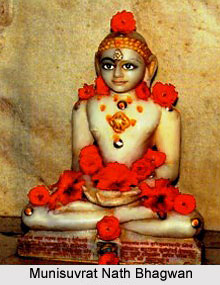 Shri 1008 Munisuvrat Nath Bhagwan Kshetra located in Paithan in Maharashtra is a Jain pilgrimage centre. It is an Atishaya Kshetra i.e. Place of Miracles
Shri 1008 Munisuvrat Nath Bhagwan Kshetra located in Paithan in Maharashtra is a Jain pilgrimage centre. It is an Atishaya Kshetra i.e. Place of Miracles
History of Paithan
According to history Paithan is an old city that was earlier known as Pratishthanpur. It belonged to the fourth era. This kshetra is dedicated to Lord Munisuvrata. It is believed that Lord Rama had worshiped this beautiful idol. Once there was widespread drought here that lasted till twelve years. During that time the Paithan was visited by Acharya Bhadrabahu along with Emperor Chandragupta Maurya and 12000 monks. Later on Vishakhaacharya and Kalkaacharya also visited this place. This place is associated with many miracles and legends. Pilgrims from different places visit the temple to worship the Lord and to fulfil their desires.
Temple of Munisuvrat Nath Bhagwan Kshetra
The Temple of Munisuvrat Nath Bhagwan Kshetra is dedicated to
Lord Munisuvrat. The idol has been magnificently carved out of a black stone. It is seated in a padmasana posture. Apart from this, the idol of Bhagwan Rishabh Dev is also installed here. The idol was unearthed from the ground. It is also seated in a padmasana posture and looks very attractive. The temple is adorned by a Manstambha or a column of dignity that is known as Mahavira Keerti Stambh. It is a masterpiece of art. The gateway of this Kshetra is also unique in its design. The carvings on Makrana`s marble are also remarkable and boast about the skills of the craftsmen.
The Temple of Munisuvrata Nath Bhagwan Kshetra is enveloped by scenic beauty. It is located at the bank of Godavari River and the lush green surroundings enthral the heart of the visitors. The environment here is very peaceful and calm and thus serves as the proper place for religious activities.
The temple organises several annual gatherings. Every year during Shani Amavasya the consecration of Lord Munisuvrata is celebrated. Another festival is held at the day of Vaishakh Krishna Dashami i.e. the day of Janam Kalyanak. The temple has provisions for dharamshalas or rest houses for the pilgrims. These are well equipped with all modern facilities. Paithan is well connected with rail and road. Busses and taxies are available from Aurangabad. Railway and air service is also available here.




















